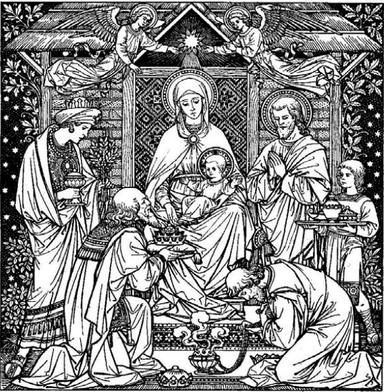 Matthew 2:1-12 ‘…falling to their knees they did him homage. Then, opening their treasures, they offered him gifts of gold and frankincense and myrrh.’ (Matthew 2:11) The story of the Magi has captured the imagination of countless generations of Christians, and why wouldn’t it? The Wise Men appear mysteriously on the scene lead by a star; they turn up to the house of the Holy Family unannounced; they bring with them precious gifts, they worship Jesus as Saviour and God, and then they leave as quickly as they arrived… Rivers of ink have been spilled about these star-gazers from the East, and there is so much we could talk about after reading their story. But perhaps the most important thing we can do this morning is to travel in spirit to Bethlehem with the Magi, and to learn something about worship from the way in which they greet the Christ-child and the gifts they bring. We read that the Magi ‘fell to their knees’ – or as the Greek text puts it, they prostrated themselves before the Christ-child. This is the way people acknowledged the presence of God in ancient times, and the way in which followers of other religions still worship now. Yet, we seem to suffer with stiff knees, don’t we? And when we cannot avoid kneeling we do so begrudgingly. Yet, the Wise Men teach us that kneeling in prayer and greeting the Lord is this way is an act of devotion, of love, which – if we are able – we should imitate. The Magi offered gold. Tradition associates this gift with the Kingship of Christ, because in ancient times only rulers and members of royal households could afford to wear gold, and only the palaces of kings or the temples of the gods could be decorated with it. But there is more. Gold was also a currency – as it still is today, and in offering it to Jesus the Magi offered financial support to the Holy Family who found themselves far from Nazareth, and on the brink of a perilous journey into Egypt. It is as if by worshipping Jesus with gifts of gold, the Wise Men were the first to put into practice the commands Jesus will give to assist those in difficulty. Likewise, the gifts we ourselves offer to the Lord – both to make his house a beautiful and resplendent place fit for the King, and to lift the poor out of misery – are an essential part of the Christian life. And the Wise Men teach us that giving is an important aspect of the way we worship God. The Magi offered frankincense. Tradition associates this gift with the Divinity of Christ, because in ancient times incense was offered only to the gods. In the Jerusalem Temple an altar was dedicated to this purpose alone, and in the house of Bethlehem the Magi offer incense to the Christ-child, to our God-made-flesh. Likewise, the incense we offer in this place (and more generally the beauty and the ritual of our liturgy) is part of the Christian life. The Magi offered myrrh. Tradition associates this gift with the Passion and Death of Christ, because in ancient times myrrh was often used to preserve the body from the effects of death and stay its decay. And in this sense it is a gift we cannot offer to the Lord anymore, because he has risen from the dead and death does not have power over him. But there is another meaning behind this gift. Myrrh was mixed with oil for anointing and consecration, so through their gift the Magi honoured the Lord Jesus as the Eternal High Priest who sacrificed himself for us. We too have been anointed with oil mixed with perfume at our Baptism and Confirmation, then – like myrrh – our life are ought to be a fragrant gift to God through the Lord Jesus . ‘…falling to their knees they did him homage. Then, opening their treasures, they offered him gifts of gold and frankincense and myrrh.’ (Matthew 2:11) We may not be able to follow a star to Bethlehem like that Magi, but every time we approach the altar we too come into the presence of the Lord Jesus, so our worship and love of him should be inspired by theirs. These mysterious travellers teach us that the worship of Christ is something beautiful and all-encompassing; including our emotions, our senses, our posture, and our possessions. Or as a Passiontide hymn puts it, Were the whole realm of nature mine, that were a present far too small. Love so amazing, so divine, demands my soul, my life, my all.
0 Comments
|
Archives
June 2020
Categories
All
|
 RSS Feed
RSS Feed


